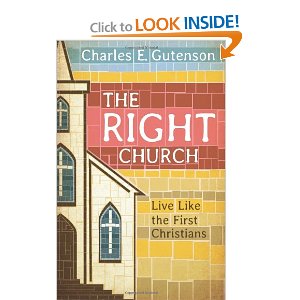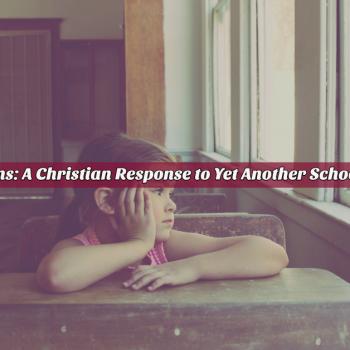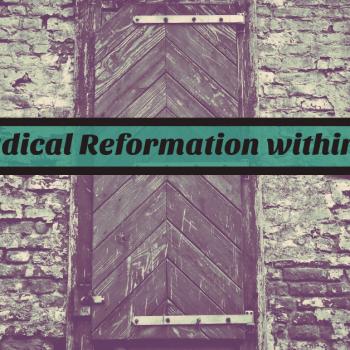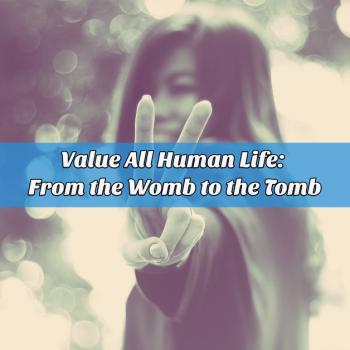Dr. Charles (Chuck) Gutenson is a church consultant and former Chief Operating Officer of Sojourners and has served as a COO in the for profit sector as well. He previously served 10 years at Asbury Seminary in Kentucky, most recently as the professor of Theology and Philosophy. He received an M.Div. from Asbury in 1995 and a PhD in Philosophical Theology from Southern Methodist University in 2000. A member of the International Society of Theta Phi, an honor society for theological students, scholars in the field of religion and outstanding religious leaders. Chuck is the author of six books (one forthcoming) and numerous articles on a variety of theological and philosophical articles. Check out his new book: The Right Church: Live Like the First Christians.
————————————————————————————————-
 The Right Church seems like a presumptuous name for a book. Care to explain the title and tell us a little about the project behind the book?
The Right Church seems like a presumptuous name for a book. Care to explain the title and tell us a little about the project behind the book?
That’s a very good question, and I have to admit that it really is something of a misnomer. If I had it to do again, I think I would have used only the subtitle with a question mark: Live Like the First Christians? Because, the goal of the project is not to say “Here is how the early church saw things, and therefore we should see them that way, too.” Instead, it is to invite the reader for a short tour through the world of the early church—a world that is, in many ways, very different than our own. At the same time, though, it is the world of our earliest spiritual parents, if you will. In taking time to see how these early Christians understood the call of Christ and how they tried to live it out in their own lives, I am convinced that there are deep riches that we can appropriate for our own lives of faith. So, as I say in the introduction, the main goal of the book is to spur us to ask the question: what can I learn from the earliest centuries of the church that can empower the church today to be more faithfully obedient to God’s intentions for us.
A popular theme on this blog is nonviolence. What did the early church writers have to say on the issues related to violence and war?
There can be no question but that Christians of the earliest period were overwhelmingly pacifist. I would say, until the year 200 pacifism was the norm for Christians. That began to change slightly from 200 to the Constantinian Edict in 313. Tertullian (160-225) was very strong in arguing that Christians could not participate in war, and he went so far as to say that those who were already soldiers must quit the military when they became followers of Jesus. There are cases during this early period where Christians chose to be martyred rather than to serve in the military. So, the period prior to 200 was clearly one that embraced pacifism as the norm, and that pretty much continued until after the year 300.
During the period prior to Constantine, the church suffered ten separate persecutions, periods where Christians were killed simply for being Christians. So, when Constantine offered to make Christianity, in essence, the official religion of the empire, we might understand how appealing that would have been, a chance finally to escape persecution at the hands of the empire. As a consequence, the church embraced the empire and it’s resistance to participation in war soon had fallen by the wayside. What we have to ask ourselves today is whether that transition was a healthy one, a move to become participants in empire, or whether it was fundamentally a mistake. The answer one gives to that goes a large way in determining how one sees pacifism today. I have my own views, of course, though for the sake of the book, I tend more to leave those to the side.
Sometimes modern day Christians assume that early church leaders were more or less on the same page on issues that we now consider controversial. Is there any truth to this assumption, or does a wider range of opinions exists in the early years of the church?
No, the early church would challenge many of the things that we take utterly for granted today. For example, we’ve just discussed how the early church saw war. I suspect that contemporary Christians largely assume that most embraced something like just war theory, and they are often shocked to see that pacifism was the norm in the early period. Another example is the way we 21st century Christians think about freedom. Most often, in our culture today, we take the term “freedom” to be synonymous with the liberty to do as you please. However, as I show, during the early church, they were much more likely to think of freedom as the freedom from sin. There is the paradoxical notion that as one becomes “freer,” the range of choices one has is actually smaller. Why? Because in being freed from our sins, we become much less likely to choose sinful behaviors. One more example, today we tend to take our responsibilities to use our possessions for the care of the poor and marginalized very much less seriously than the early church. Rather than seeing “our stuff” as ours, it was not unusual to find the early church preachers reminding the well-to-do of the obligations that attend wealth. For example, John Chrysostom once commented, “That spare coat you have in your closet, you stole that from the poor.” How shocking is that to us today?
It seems that the issues Christians are talking about have not changed much in 2000 years. In your research and writing for The Right Church, did you find anything that surprised you?
Actually, I think what has surprised me most, over the years of teaching and covering some of these different themes, is how interested and receptive students have been to hear these challenging words of the early church fathers and mothers. As you can see, many of their ways of seeing the world run counter to and challenge our own, but I often find that students are suspicious that the call of Christ on our lives is more radical than we often want to admit. When they hear the challenging words of the fathers, they seem very much open to considering what they have to say. It is rewarding to see such openness to the radical call of Christ on our lives.
You assert in the intro of The Right Church that you are primarily interested in church renewal. How does a project that recounts the views of a bunch of dead guys who often did not get along help the church today?
Ah, yes, the “old dead guys” question :-). To say that the church is in decline in the West would be almost cliché at this point. The number of folks who self-identify as Christian has been in decline for 60 years, at least. So, what do we do about that? What I am suggesting in The Right Church is that one of the things that we need to be done is once again to return to the rich resources that are ours in the broader Christian tradition, particularly, in this book, the ones that come to use through the words and wisdom of the earliest centuries of our history. Will everything turn out to be useful? Probably not. Will we simply be able to import their words into our own time? Sometimes yes, sometimes no. But, we do need to hear what they say to us. And, after hearing what they have to say, we need to consider carefully how their wisdom might influence how we live the life of faith today. I have invested a good deal of time and energy in the belief that we have much to learn from them and that our own challenges to renew the church will benefit from the time we take to spend with the early church.












